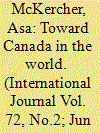|
|
|
Sort Order |
|
|
|
Items / Page
|
|
|
|
|
|
|
| Srl | Item |
| 1 |
ID:
185921


|
|
|
|
|
| Summary/Abstract |
This article challenges existing interpretations of Central Asia as a geographical entity. Adopting a history of technology approach to defining and analytically ‘constructing’ Central Asia as a region, it scrutinizes the ways the region has been materially created over the years through four types of large technical systems (infrastructures): waterways, railways, electricity grids and natural gas pipelines. This process, which is traced over a period of 150 years, can be thought of as Central Asia’s ‘hidden integration’ (and ‘hidden fragmentation’). The article maps the processes through which different parts of the region have become technically interlinked through the four systems, and Central Asia’s resulting ‘network geography’. It also studies the historical tensions, as they evolved over time, between ‘system-builders’ and ‘border-builders’.
|
|
|
|
|
|
|
|
|
|
|
|
|
|
|
|
| 2 |
ID:
143851


|
|
|
|
|
| Summary/Abstract |
During 1935, a transnational social movement coalesced to protest the Italian Fascist régime’s escalating threats to invade Ethiopia. Although the global antiwar movement failed to prevent war, it did, day by day through diffuse acts, transform the dynamics of global politics. Using a repertoire of informal political practices, including mass meetings, street fights, riots, and strikes, the movement enabled common people to directly assert themselves on a question of international affairs. This article makes the case for recognizing the Hands Off Ethiopia campaign as a critical turning point in the making of a twentieth-century global left, with effects on international history that continued into World War II and lasted through the postwar era of decolonization. Conceptually, “Local People’s Global Politics” recommends that transnational history attend to the flow of ideas and power between spatial scopes such as the local and the global.
|
|
|
|
|
|
|
|
|
|
|
|
|
|
|
|
| 3 |
ID:
154642


|
|
|
|
|
| Summary/Abstract |
As a field of study, Canadian Foreign Policy history has been on life support for the better part of three decades. While its resiliency speaks to the commitment of its practitioners, the fact that Canadian international history has largely been sidelined is troubling given both the field’s importance generally and its appeal to undergraduate students and the wider public. Yet, at the same time as Canadian Foreign Policy history has been in stasis, a new field examining Canadian interactions with the world through transnational and cultural lenses has arisen. As the apocryphal Chinese proverb puts it, this situation presents both danger and opportunity for Canadian international history. In this article I explore how Canadian international historians might seize the initiative by crafting a new, expansive field of study—Canada in the World—which preserves the study of Canadian Foreign Policy while incorporating other analytical approaches.
|
|
|
|
|
|
|
|
|
|
|
|
|
|
|
|
| 4 |
ID:
193614


|
|
|
|
|
| Summary/Abstract |
The Ming-Qing transition (1618–1683), a dynastic upheaval that not only consumed much of China, but also saw the Qing invasion of Joseon Korea and an influx of refugees into Tokugawa Japan, was a source of inspiration for writers across East Asia. Unofficial, contemporary histories written by Ming and early Qing subjects made their way by land and sea to Korea and Japan, where they were either adapted for domestic audiences or used as the basis for new unofficial histories of the dynastic transition.
|
|
|
|
|
|
|
|
|
|
|
|
|
|
|
|
|
|
|
|
|